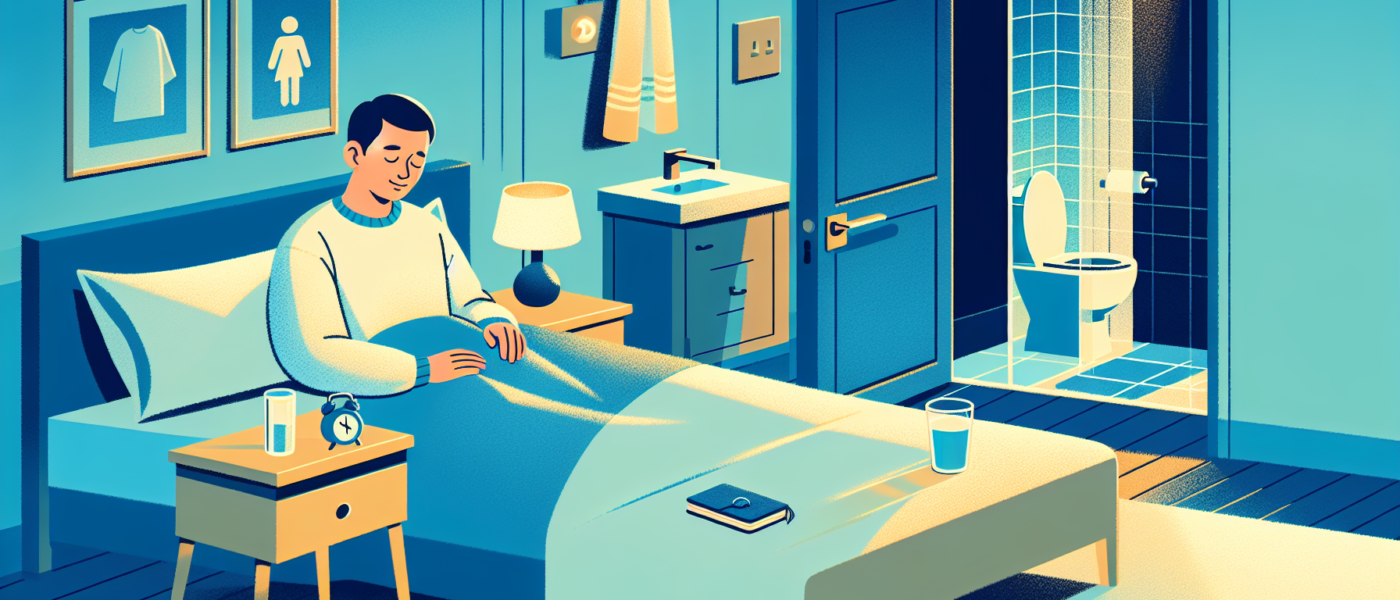Managing Nighttime Urination: Sleep Strategies for Men 50+
Key Takeaways
- Nighttime urination, or nocturia, is a common issue for men over 50.
- Lifestyle changes including diet, hydration, and exercise can reduce the need to urinate at night.
- Sleep hygiene practices and bladder training can improve the quality of sleep.
- Medical treatments are available for more severe cases, and consulting a healthcare provider is recommended.
Understanding Nocturia: The Basics
Nocturia, or the need to wake up during the night to urinate, is a common condition for men over the age of 50. It can significantly disrupt sleep, leading to daytime fatigue, reduced cognitive function, and a lower quality of life. While occasional nighttime urination might be normal, frequent episodes warrant a closer look into possible causes and effective management strategies.
Common Causes of Nocturia
Age-related Changes
With age, the bladder’s capacity to hold urine decreases, and the production of a hormone that helps concentrate urine during sleep, vasopressin, also diminishes. These physiological changes can lead to increased nocturnal urine production.
Prostate Enlargement
Benign Prostatic Hyperplasia (BPH), or prostate enlargement, is a common concern for men as they age. An enlarged prostate can press against the bladder and urethra, causing increased frequency and urgency of urination, particularly at night.
Fluid Intake
Excessive fluid intake, especially in the late evening or night, can lead to increased urine production. Caffeinated and alcoholic beverages also act as diuretics, which can exacerbate the problem.
Medications
Certain medications, such as diuretics used for blood pressure management, can increase urine production. Timing these medications earlier in the day may help alleviate nighttime urination.
Lifestyle Changes to Manage Nocturia
Monitor Fluid Intake
Reducing fluid consumption in the evening can significantly decrease the need to urinate during the night. Hydrate well throughout the day and limit drinks a few hours before bedtime.
Adjust Diet
Avoiding foods and drinks that irritate the bladder, such as spicy foods, citrus, caffeine, and alcohol, can help minimize nocturia. Additionally, a well-balanced diet might aid in overall bladder health.
Incorporate Regular Exercise
Regular physical activity can improve overall health and reduce BPH symptoms. Engaging in pelvic floor exercises, like Kegels, can strengthen the muscles around the bladder and urethra, potentially reducing nighttime urination.
Enhancing Sleep Hygiene
Establish a Sleep Schedule
Going to bed and waking up at consistent times creates a stable sleep pattern, which can minimize disturbances like nocturia. Aim for 7-9 hours of sleep each night.
Create a Relaxing Bedtime Routine
Engage in activities that promote relaxation before bedtime, such as reading, taking a warm bath, or practicing meditation. Reducing stress and anxiety can improve sleep quality.
Optimize the Sleep Environment
Make the bedroom conducive to sleep by keeping it cool, dark, and quiet. Use comfortable bedding and a supportive mattress to enhance sleep comfort.
Bladder Training Techniques
Scheduled Voiding
Establish a regular urination schedule during the day to train the bladder to hold urine for longer periods. Gradually increase the interval between bathroom visits.
Double Voiding
Before bed, practice double voiding—urinate as usual, wait a few minutes, and then try to urinate again. This technique ensures the bladder is as empty as possible before sleep.
Medical Treatments and Interventions
Medications
Several medications can help manage nocturia, including anticholinergic drugs, which reduce bladder contractions, and desmopressin, which mimics the action of vasopressin to reduce urine production at night. Always consult a healthcare provider before starting any new medication.
Minimally Invasive Procedures
For more severe cases related to BPH, minimally invasive procedures such as Transurethral Resection of the Prostate (TURP) or laser therapy can alleviate symptoms by reducing prostate size and improving urine flow.
Surgical Options
In extreme cases where other treatments fail, surgical interventions might be necessary to address underlying issues like significant prostate enlargement or bladder dysfunction.
When to Consult a Healthcare Provider
If nocturia significantly disrupts sleep or if you notice other worrisome symptoms such as painful urination, blood in the urine, or a sudden increase in frequency, consult a healthcare provider. A thorough evaluation can determine the underlying cause and guide appropriate treatment options.
Conclusion
Nighttime urination can be a burdensome issue for men over 50, but with strategic lifestyle changes, effective sleep hygiene practices, and appropriate medical interventions, it can be managed effectively. Prioritizing overall health, monitoring diet and fluid intake, and employing bladder training techniques can significantly improve sleep quality and day-to-day life.

